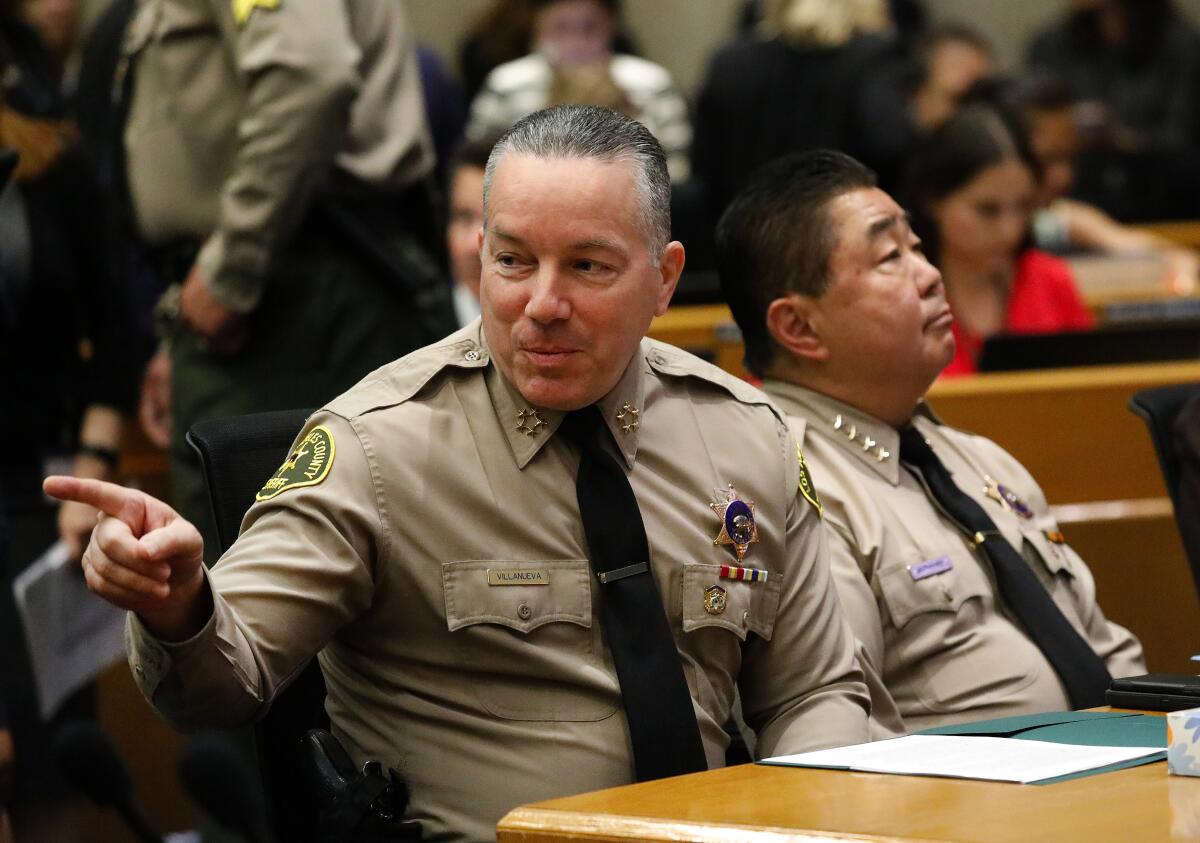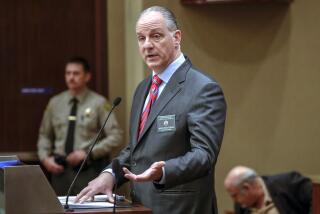L.A. County supervisors approve subpoena authority in power struggle with sheriff

Since Los Angeles County Sheriff Alex Villanueva took office more than a year ago, his department’s chief watchdog has said it’s been blocked from obtaining internal records needed to monitor the agency.
Now, the Board of Supervisors is ramping up authority to force the issue, voting unanimously Tuesday to grant the Civilian Oversight Commission subpoena power at a time of heightened tensions between the law enforcement agency and those who oversee it.
The tool will allow the commission to direct the Office of Inspector General to compel records from the Sheriff’s Department when deemed necessary. The office has said it’s been stonewalled when seeking information about the agency’s internal discipline system and hiring process, as well as documents related to secret deputy cliques with matching tattoos that have been accused of misconduct.
“It’s a good tool to have in the toolbox,” Supervisor Sheila Kuehl said.
The goal, said Supervisor Kathryn Barger, is for the Sheriff’s Department to comply with information requests so that the commission doesn’t have to resort to subpoenas.
“We’re supposed to all be on the same team,” she said.
A county attorney said the Sheriff’s Department could challenge in court any subpoena it feels is overly broad or otherwise illegal.
The Sheriff’s Department said Tuesday that Villanueva was unavailable for an interview. But at the meeting, Asst. Sheriff Steve Gross said increasing the inspector general’s power could harm investigations and would pit county departments against one another.
The board’s move followed a particularly contentious public meeting last week in which Inspector General Max Huntsman laid out more than a year’s worth of transparency problems for the commission. Requests his office makes for information under the county code are repeatedly ignored, he said.
Early on, Huntsman said, he had asked for the text of proposed changes to policies and information about prior disciplinary actions the sheriff intended to review, but did not receive an answer.
“The question is, is the county code being complied with? The answer is no,” Huntsman told the commission. “The Sheriff’s Department has always operated in a very secretive manner. And oversight is in part about trying to lift that veil back.”
Gross said at the meeting last week that he would consult with an attorney before responding to Huntsman’s allegations that the Sheriff’s Department was breaking the law.
“I personally had high hopes for this year, I think this is a tough way for us to start out,” Gross said.
In response, Huntsman noted that the Sheriff’s Department is criminally investigating his office over allegations it unlawfully obtained internal records.
“Have I cowered in the corner? I have not. Nor will I,” Huntsman said. “And you won’t be hearing from my lawyer, you’ll be hearing from me.”
Sean Kennedy, a Loyola Law School professor and member of the commission, questioned the Sheriff’s Department’s claim that records have been withheld to protect the integrity of criminal investigations.
The real reason for the secrecy “is self-protection, or a reflexive resistance to civilian oversight,” Kennedy said. “I hope that subpoena power will be the answer.”
In a letter to the commission’s executive director Friday, Villanueva said he planned to keep his staff from attending future meetings until the commission addressed their treatment.
His representatives, he wrote, were “insulted, accused of alleged improper conduct, subjected to foul language, and generally subjected to disrespectful behavior primarily by Mr. Huntsman and the public with no interference by anyone to mitigate this treatment.”
He said he’d opt instead to have county counsel represent the Sheriff’s Department and send a non-uniformed staff member to observe.
Villanueva alleged that commission’s monthly meetings have become a forum to attack the agency instead of “create a bridge” with the community.
On Tuesday, Brian Williams, executive director of the commission, said it’s crucial that the Sheriff’s Department participate in the meetings.
“If we want to make this system better, it’s going to require the engagement of everyone involved. To disengage from that is fundamentally a problem,” he said. “Democracy isn’t always genteel and nice.”
The inspector general and commission are among a number of watchdogs raising concerns about what they see as a lack of transparency within the Sheriff’s Department.
A lawsuit filed by the American Civil Liberties Union in Southern California contends that the department is violating state law by refusing to release records related to deputy shootings.
More to Read
Start your day right
Sign up for Essential California for news, features and recommendations from the L.A. Times and beyond in your inbox six days a week.
You may occasionally receive promotional content from the Los Angeles Times.







